
The Shining (1980)
by Tim DirksAs in many of his films, director Kubrick explores the dimensions of the genre to create the ultimate horror film - he deliberately reduces the pace of the narrative and expands the rather simple plot of a domestic tragedy to over two hours in length, creates lush images within the ornate interior of the main set, adds a disturbing synthesized soundtrack (selecting musical works from Bela Bartok, Gyorgy Ligeti, and Polish composer Krzysztof Penderecki), filmed most of the gothic horror in broad daylight or brightly-lit scenes, and built an unforgettable sensation of terror, ghosts, and the paranormal. The principal, ghostly character in the film is the classic haunted house - a huge, isolated Colorado mountain resort hotel, the Overlook.

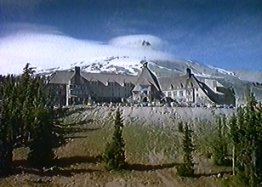
The Interview
Jack Torrance (Jack Nicholson in his first major role since One Flew Over the Cuckoo's Nest) strolls into the palatial lobby of the Overlook, inquiring to see General Manager Mr. Stuart Ullman (Barry Nelson) for his appointment - he has driven three and a half hours distance from his home.
In the kitchen/dinette of the Torrance's home in Boulder, Colorado [where they have lived only about three months after relocating from Vermont where Jack was a school teacher], seven year-old son Danny (Danny Lloyd) eats a lunch of white-bread and milk with his passive, skinny, black-haired mother "Wendy" Winifred (Shelley Duvall), who is reading The Catcher in the Rye.
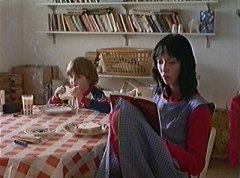
Danny: Do you really want to go and live in that hotel for the winter?
Wendy: Sure I do. It'll be lots of fun.
Danny: Yeah, I guess so. Anyway, there's hardly anybody to play with around here.
Wendy: Yeah, I know. It always takes a little time to make new friends.
Danny: Yeah, I guess so.
Wendy: What about Tony? He's lookin' forward to the hotel, I bet.
Danny: (He uses his index finger as a bobbing, puppet-figure to act and speak in a roughened voice like Tony - a fantasy character of his imagination.) No he isn't, Mrs. Torrance.
Wendy: Now come on, Tony, don't be silly.
Danny (as Tony): I don't want to go there, Mrs. Torrance.
Wendy: Well, how come you don't want to go?
Danny (as Tony): I just don't.
Wendy: Well, let's just wait and see. We're all going to have a real good time.
In the hotel office, Ullman announces that former school-teacher, aspiring novelist Jack (and his family) will be caretaker(s) of the hotel during the upcoming winter: "Jack is, uh, going to take care of the Overlook for us this winter." His former wage-earning job, which made ends meet, got in the way of his writing:
Ullman: Jack is a school teacher...
Jack: Uh, formerly a school-teacher...I'm a writer. Umm, teaching's been more or less a way of making ends meet...I'm lookin' for a change.
General Manager Ullman explains that the regular season runs from "May 15 to October 30th and then we close down completely until the following May" - a period of six months when the deserted, off-season, snow-bound hotel is closed and inaccessible during the brutal winter. Mild-mannered, congenial Jack has already been recommended and hired through the Denver office, so Ullman dispenses with typical interview questions and describes the job's essential requirement - to keep the cruel, winter "elements" (both physical and psychological) at bay with maintenance and repair of the building.
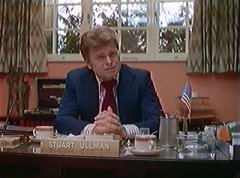
Ullman: When the place was built in 1907, there was very little interest in winter sports. And this site was chosen for its seclusion and scenic beauty.
Jack: Well, it's certainly got plenty of that, ha, ha.
Ullman: ...The winters can be fantastically cruel. And the basic idea is to cope with the very costly damage and depreciation which can occur. And this consists mainly of running the boiler, heating different parts of the hotel on a daily, rotating basis, repair damage as it occurs, and doing repairs so that the elements can't get a foothold.
Jack: Well, that sounds fine to me.
Ullman: Physically, it's not a very demanding job. The only thing that can get a bit trying up here during the winter is, uh, a tremendous sense of isolation.
Jack: Well, that just happens to be exactly what I'm looking for. I'm outlining a new writing project and, uh, five months of peace is just what I want.
Ullman: That's very good Jack, because, uh, for some people, solitude and isolation can, of itself become a problem.
Jack: Not for me.
Ullman: How about your wife and son? How do you think they'll take to it?
Jack: They'll love it.
Without wanting to sound "melodramatic" because "it's something that's been known to give a few people second thoughts about the job," Ullman sheepishly reveals the hotel's disturbing, murderous history - a real-life horror movie recipe about a previous care-taker who was affected by the isolation and loneliness of the bleak hotel:
Ullman: I don't suppose they, uh, told you anything in Denver about the tragedy we had up here during the winter of 1970.
Jack: I don't believe they did.
Ullman: Well, uh, my predecessor in this job, hired a man named Charles Grady as the winter caretaker. And he came up here with his wife and two little girls, I think about eight and ten. And he had a good employment record, good references, and from what I've been told, I mean he seemed like a completely normal individual. But at some point during the winter, he must have suffered some kind of a complete mental breakdown. He ran amuck, and uh, killed his family with an axe. Stacked 'em neatly in one of the rooms of the West Wing, and uh, then he, uh, he put, uh, both barrels of a shotgun in his mouth. Police, uh, they thought that was what the old-timers used to call cabin-fever. Kind of claustrophobic reaction which can occur when people are shut in together over long periods of time.
Jack: Well, that is, uh, quite a story.
Ullman: Yeah it is. Oh, it's still hard for me to believe it actually happened here. But it did, and uh, I think you can appreciate why I wanted to tell you about it.
Jack: I certainly can, and uh, I also understand why your people in Denver left it for you to tell me.
Ullman: Well, obviously, some people can be put off by the idea of staying alone in a place where something like that actually happened.
In the first of many eloquent smiles during his deferential interview, an unruffled Jack arches his sharply-angled eyebrows and assures Ullman that he won't follow in the footsteps of the previous winter caretaker who murdered his family on the premises. He also supposes that his wife will be fascinated by the hotel's horrific history:
Well, you can rest assured, Mr. Ullman, that's not gonna happen with me. And, uh, as far as my wife is concerned, uh, I'm sure she'll be absolutely fascinated when I tell her about it. She's a confirmed ghost story and horror film addict.
In front of his home's bathroom mirror as he brushes his teeth, hyper-intuitive Danny is already receiving clairvoyant, visionary messages (his gift of "shining") from his make-believe playmate "Tony." He is told that his father has been offered the hotel job. Danny foresees the future with his psychic powers, accurately predicting that Wendy will receive a phone call from Jack about the job.
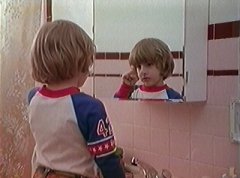
While trying to diagnose the not-uncommon "episode," although there is "nothing physically wrong with Danny" and he has no serious malady, the soft-spoken doctor describes that the reaction was brought on "by emotional factors - and they rarely occur again. They're more akin to auto-hypnosis, a kind of self-induced trance." According to quiet-spoken Wendy, there is a history of violence in their family [parallel to the history of violence at the hotel.] Danny started talking to "Tony" around the time he was put into nursery school when they lived in Vermont. The visions and psychic powers developed as a reaction of the boy's fervent imagination to his school and to his then-alcoholic father's abuse and mistreatment - Danny's shoulder was dislocated in a serious injury during his father's drunken rage, according to a jittery, rationalizing, naive, ultra-tolerant Wendy:
It was just one of those things, you know. Purely an accident. My husband had, uh, been drinking, and he came home about three hours late. So he wasn't exactly in the greatest mood that night. And, well, Danny had scattered some of his school papers all over the room, and my husband grabbed his arm and pulled him away from them. It's-it's just the sort of thing you do a hundred times with a child, you know, in the park or in the streets. But on this particular occasion, my husband just used too much strength and he injured Danny's arm. (she gives a nervous laugh) Anyway, something good did come out of it all, because he said: 'Wendy, I'm never gonna touch another drop. And if I do, you can leave me.' And he didn't, and he hasn't had any alcohol in, uh, five months.
Closing Day
More aerial photography follows the family's car on its serpentine way to the hotel for the winter. During the drive, Wendy and Jack (who is already appearing slightly metamorphisized and faintly scowling), discuss the historic Donner Party accident - a trapped and doomed group of early pioneers who became snowbound and cannibalistic - a foreshadowing of their own impending doom. Jacks' face gradually forms a lurid smile as he speaks, with apparent pleasure, of the legendary settlers. Danny assures his mother that the ugly incident in American history won't upset him, because the mass medium of television has already informed him about it:

Wendy: Hey! Wasn't it around here that the Donner Party got snowbound?
Jack: I think that was farther west in the Sierras.
Wendy: Oh.
Danny: What was the Donner Party?
Jack: They were a party of settlers in covered-wagon times. They got snowbound one winter in the mountains. They had to resort to cannibalism in order to stay alive.
Danny: You mean they ate each other up?
Jack: They had to, in order to survive.
Wendy: Jack...
Danny: Don't worry, Mom. I know all about cannibalism. I saw it on TV.
Jack: See, it's OK. He saw it on the television.
During a tour of the luxurious and beautiful hotel in a tracking shot that follows Ullman, Jack, and Wendy, they pass numerous workmen closing up the facility for the winter. In the richly-furnished hotel (in the Colorado Lounge), which has incongruously had a long "illustrious" history of violent crime as well as being an entertainment mecca and quasi-history book [of man's inhumanity to man], the family learns about the furnishings based upon American Indian motifs and patterns, and the kinds of people who partied there in the past:
Wendy: Are all these Indian designs authentic?
Ullman: Yeah I believe, the basics. Mainly on Navajo and, uh, Apache motifs.
Wendy: Oh, well they're really gorgeous. As a matter of fact, this is probably the most gorgeous hotel I've ever seen.
Ullman: Oh, this old place has had an illustrious past. In its hey-day, it was one of the stopping places for the jetset, even before anybody knew what a jetset was. Yet four presidents have stayed here. Lots of movie stars.
Wendy: Royalty?
Ullman: All the best people.
In the game room where Danny amuses himself by throwing darts, he has another flash of a premonition - the two, blue party-dressed young girls make another visitation - they stand and watch him, and then turn away. Ullman shows the Torrances the staff quarters: "The place is very nicely self-contained, easy to keep...Yes, very cozy for a family." Jack comments: "Well, it's very, uh, homey."
Outdoors, they are walked around the carefully-sculpted hedges that compose the Overlook Hedge Maze - "it's quite an attraction around here. The walls are thirteen feet high and the hedges about as old as the hotel itself. It's a lot of fun, but I wouldn't want to go in there unless I had an hour to spare to find my way out." They also learn about the Overlook's history [a significant name - the hotel overlook-ed the heritage it was built upon], and how its construction was linked to Indian death and extinction:
Construction started in 1907. It was finished in 1909. The site is supposed to be located on an Indian burial ground and I believe they actually had to repel a few Indian attacks as they were building it.
They are walked by the large tread-wheeled, bright red Sno-Trac: "The Sno-Cat operates very much like a car and it won't take you very long to get the hang of it." As the Torrances are taken back inside into the giant Gold Room ballroom, Ullman describes the space which will soon be empty and devoid of any social influences:
Ullman: We can accommodate up to three hundred people here very comfortably.
Wendy: Boy, I'll betcha we could really have a good party in this room, huh hun?
Ullman: I'm afraid you're not gonna do too well here, unless you brought your own supplies. We always remove all the booze from the premises when we shut down. That reduces the insurance we normally have to carry.
Jack: We don't drink.
Ullman: Well then, you're in luck.
The new caretakers are introduced to the friendly, black, Head Chef Dick Hallorann (Scatman Crothers). A woman ushers in Danny, who, she reports, was thoughtlessly lost and separated from his family: "I found him outside looking for you." Hallorann takes Wendy and Danny for a tour of the giant, brightly-gleaming kitchen [in the only instance when the three 'good' characters are together by themselves]. In the cavernous space, Wendy jokes: "This whole place is such an enormous maze I feel like I'll have to leave a trail of bread crumbs every time I come in." Hallorann assures them: "Well, one thing for sure, you won't have to worry about food, because you folks can eat up here a whole year and never have the same menu twice."
In the walk-in freezer chamber, he shows off the great storeroom of food wealth and abundance of typically American meats: "You've got fifteen rib roasts, thirty ten-pound bags of hamburger, we got twelve turkeys, about forty chickens, fifty sirloin steaks, two-dozen of pork roasts, and twenty legs of lamb." In two instances, Hallorann calls Danny by his family nickname: "You like lamb, Doc?" And when Danny explains his favorite foods are French fries and ketchup, Hallorann chuckles: "Well, I think we can manage that too, Doc." (Hallorann hints that he shares the same psychic powers as Danny by knowing his nickname). Wendy asks how he knows the nickname, adding: "We call him Doc sometimes, you know, like in the Bugs Bunny cartoons." Hallorann evades giving an answer: "Well, I guess I probably heard you call him that."
In the storeroom, Hallorann again tabulates the vast quantity of dry goods and canned goods:
We've got canned fruits and vegetables, canned fish and meats, hot and cold syrups, Post Toasties, Corn Flakes, Sugar Puffs, Rice Krispies, Oatmeal...and Cream of Wheat. You got a dozen jugs of black molasses, we got sixty boxes of dried milk, thirty 12-lb bags of sugar...Now we got dried peaches, dried apricots, dried raisins and dried prunes.
When his voice fades but his lips still move, Hallorann communicates telepathically with Danny and they have their first "shining" experience of psychic kinship. [Behind Hallorann on the shelf sits a large can of CALUMET Baking Powder with its Indian chief head trademark logo - a subliminal link to the doomed Indian heritage.] He turns to Danny and telepathically whispers a wish-fulfilling promise:
How'd you like some ice cream, Doc?
Outside the storeroom, as Wendy departs with Jack and Ullman, Danny is offered ice cream by Hallorann: "Would you like ice cream, Doc?...I thought you did." During the remainder of their tour, the Torrances are warned that they will soon be the only ones there:
Ullman: By five o'clock tonight, you'll never know anybody was ever here.
Wendy: Just like a ghost ship, huh?
While Danny is being served chocolate ice cream by Hallorann, he learns that they both have psychic powers (of clairvoyance and telepathy), a mysterious phenomenon of ESP that Hallorann's grandmother called "the shining." The young boy is advised about his power and warned to stay away from Room 237 where there could be powerful psychic imprints or "traces" left from past acts of violence in the long, unfortunate history of the hotel:
Hallorann: I can remember when I was a little boy. My grandmother and I could hold conversations entirely without ever opening our mouths. She called it "shining." And for a long time, I thought it was just the two of us that had the shine to us. Just like you probably thought you was the only one. But there are other folks, though mostly they don't know it, or don't believe it. How long have you been able to do it? (No response from a reluctant Danny) Why don't you want to talk about it?
Danny: I'm not supposed to.
Hallorann: Who said you ain't supposed to?
Danny: Tony.
Hallorann: Who's Tony?
Danny: Tony is a little boy that lives in my mouth.
Hallorann: Is Tony the one that tells you things?
Danny: Yes.
Hallorann: How does he tell you things?
Danny: It's like I go to sleep, and he shows me things. But when I wake up, I can't remember everything.
Hallorann: Does your Mom and Dad know about Tony?
Danny: Yes.
Hallorann: Do they know he tells you things?
Danny: No. Tony told me never to tell 'em.
Hallorann: Has Tony ever told you anything about this place? About the Overlook Hotel?
Danny: I don't know.
Hallorann: Now think real hard now. Think!
Danny: Maybe he showed me something.
Hallorann: Try to think of what it was.
Danny: Mr. Hallorann, are you scared of this place?
Hallorann: No. Scared - there's nothin' here. It's just that, you know, some places are like people. Some 'shine' and some don't. I guess you could say the Overlook Hotel here has somethin' almost like 'shining.'
Danny: Is there something bad here?
Hallorann: Well, you know, Doc, when something happens, you can leave a trace of itself behind. Say like, if someone burns toast. Well, maybe things that happen leave other kinds of traces behind. Not things that anyone can notice, but things that people who 'shine' can see. Just like they can see things that haven't happened yet. Well, sometimes they can see things that happened a long time ago. I think a lot of things happened right here in this particular hotel over the years. And not all of 'em was good.
Danny: What about Room 237?
Hallorann: Room 237?
Danny: You're scared of Room 237, ain't ya?
Hallorann: No I ain't.
Danny: Mr. Hallorann. What is in Room 237?
Hallorann: Nothin'! There ain't nothin' in Room 237. But you ain't got no business goin' in there anyway. (forcefully) So stay out! You understand? Stay out!
A Month Later
A distant shot of the Overlook in the morning light, with the echoing sound of a coyote in the mountains. Wendy pushes a stainless steel breakfast cart from the kitchen and across the Colorado Lounge. In a Steadi-cam tracking shot, a low-angle camera follows behind Danny as he pedals his low-riding blue tri-cycle in a complete circuit around the ground floor of the hotel - through the kitchen corridor, front office and lobby entrance, and then back into the kitchen corridor. The sound of his wheels alternatingly hitting deep, soft carpet (CLUMP) and bare wooden floors (WHOOSH) reflect back different sound textures. Although one anticipates that he will run into something around each corner, as in a typical horror film, there are no scary apparitions around any of the corners.
Wendy enters their bedroom and prepares to serve breakfast in bed to Jack - the lettering on his T-shirt is reversed - the scene is shot in his mirror image to deliberately dislocate his appearance. He is awakened and amazed to think that it is already eleven-thirty. He mutters that he should try to write after eating, but he has no viable ideas: "Lots of ideas, no good ones." Unintelligently, Wendy assumes that he only needs to get into the habit of writing regularly: "It's just a matter of settlin' back into the habit of writing every day."
After one month, both of them have become semi-adjusted, especially Jack who feels at home in the rambling space:
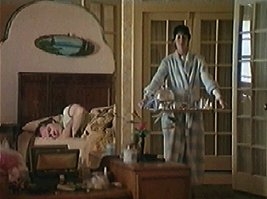
Wendy: It's really nice up here, isn't it?
Jack: I love it. I really do. I've never been this happy or comfortable anywhere.
Wendy: Yeah, it's amazing how fast you get used to such a big place. I tell ya, when we first came up here, I thought it was kind of scary.
Jack: I fell in love with it right away. When I came up here for my interview, it was as though I had been here before. I mean, we all have moments of 'deja-vu,' but this was ridiculous. It was almost as though I knew what was going to be around every corner.
Later, in the vast, empty space of the Colorado Lounge where Jack has set up his typewriter (a blank white page sits waiting for him), he appears to lack creativity, entirely entropic - bankrupt of ideas, mind, and spirit. Instead of pounding away to turn out pages of writing, he repeatedly, in frustration, throws a tennis ball against a Native-American rug hanging [another symbol of the white man's hostility toward the Native-American race which was annihilated].
Outside, Wendy teasingly chases her son into the Overlook Maze built of hedges on the grounds. They explore the convoluted passageways of the maze - and struggle to find their way around. While wandering through the lobby of the hotel at the same time, Jack ambles over to a table-top scale model of the Maze outside. As he leans over and peers downward on the miniature replica with a domineering gaze, an overhead God's eye-view of the Maze appears. An indication of his impending madness, or evidence that his spirit is in league with the Overlook, he seems to see his wife and son strolling in the hedges of the Maze. The camera tracks slowly into the mirror-image of the outdoor Maze, picking up two small figures and faint voices moving in the Maze - it is his wife and son in the very center of the maze. The next camera shot is a normal, eye level view of the two walking in the Maze.
Tuesday
In the kitchen while opening a large can of fruit cocktail and preparing a meal, Wendy calmly listens to a chilling TV news broadcast about a criminal serving a life sentence in a 1968 shooting, and a continuing search in the mountains for a missing 24 year-old Aspen woman who was on a "hunting trip with her husband" - both stories foreshadow similar dislocations and murders. The search may have to be called off as weathermen predict that a snowstorm will move in the next day.
Another tracking shot closely follows behind Danny as he rides his bike around through the winding, labyrinthine corridors of the hotel, passing rooms on his left and right. He pauses, curiously, at forbidden Room 237 where he feels vibrations. He contemplates entering, feeling both fear and courage. Danny twists the door knob, but the door is locked. He glimpses another ghostly view of the two blue-dressed sisters in the flower-decorated hallway (in a quick, insert cut). And then he pedals off.
Aspiring, but frustrated novelist Jack struggles to create in the Colorado Lounge. Like an automaton, he pounds away feverishly at his typewriter - each keystroke echoing in the vast hallway. When waif-like Wendy, his banal wife, comes up to him and wishes to chat and inquires how he is doing, he rips the paper from the typewriter. (A scrapbook - of the hotel's unsavory history? - sits next to him on the table. Does he reflexively yank out the sheet of paper to conceal it from her?) The impending forecast of a snowstorm spells more closing in, claustrophobia, restriction, and barrenness, and Jack has already begun his descent into madness. His mood quickly degenerates. Blaming his writer's block on his wife, he forever ostracizes her from the Colorado Lounge when he is working:
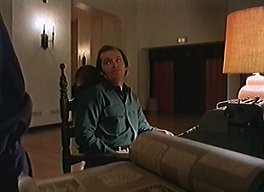
Wendy: Get a lot written today?
Jack: Yes.
Wendy: Hey! Weather forecast said it's gonna snow tonight.
Jack: What do you want me to do about it?
Wendy: Aw, come on, hun. Don't be so grouchy.
Jack: I'm not being grouchy. I just want to finish my work.
Wendy: OK, I understand. I'll come back later on with a couple of sandwiches for ya, and maybe you'll let me read something then.
Jack: Wendy, let me explain something to you. Whenever you come in here and interrupt me, you're breaking my concentration. You're distracting me. (He hits his head with the palm of his hand and rips up his manuscript) And it will then take me time to get back to where I was. Understand?
Wendy: Yeah.
Jack: Fine. I'm gonna make a new rule. Whenever I'm in here, and you hear me typing (he types keys to demonstrate), whether you don't hear me typing, whatever the f--k you hear me doing in here, when I'm in here, that means that I am working. That means don't come in. Now do you think you can handle that?
Wendy: Yeah.
Jack: Fine. Why don't you start right now and get the f--k out of here?
Wendy: OK.
Thursday
During the blinding snowstorm, Wendy and Danny frolic outside. Jack feels the pressures of isolation - he slips more out of touch with reality and loses control. The camera tracks in on his disheveled, unkempt, unshaven face - his lobotomized eyes stare meaninglessly into space. A fire burns behind him. A leering, half-devilish, satanic grin slowly crosses his mouth.
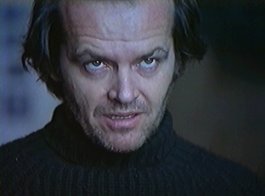
Two days later, as the snowstorm worsens, Wendy finds that the telephones are inoperative. She transmits a CB radio message from the hotel's CB radio (KDK 12) to the U.S. Fire Service (KDK 1), confirming that the telephone lines, downed from the storm, have cut them off almost entirely from civilization: "Most winters, they stay that way until spring...It's one of the worst we've had for years."
On another of his exploratory bike rides as he comes around a corner in his inexorable progression, Danny is petrified when he confronts the two undead girls at the end of a hallway blocking his way. In unison, they beckon to him in metallic, other-worldly voices with an invitation: "Hello Danny, Come and play with us. Come and play with us, Danny." For an instant, Danny is horrified to "see" another slide-show flash with horrific images of the carnage of past murders - the two mutilated girls lie in large pools of blood in a blood-splattered hallway, with an oversized axe lying on the floor in front of them. And then they add as they appear to get closer: "...for ever, and ever, and ever." He covers his eyes to shut out the deathly apparitions. As he slowly uncovers his eyes, it appears that they have vanished.
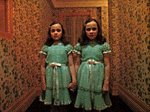
Danny: Tony, I'm scared.
Tony: Remember what Mr. Hallorann said. It's just like pictures in a book, Danny. It isn't real.
Monday
Marooned by the storm, Wendy and Danny watch the nostalgic, coming-of-age film Summer of '42 (1971) on television. After Danny receives permission from his mother to go to his room to retrieve his fire engine - but expressly cautioned to not make a sound because his father only went to bed "a few hours ago," he tip-toes into his father's bedroom. There as he passes by his father's room, he finds his insomniac father awake, sitting at the edge of his bed and staring zombie-like into space. In a stuporous voice (and with a disorienting double image of him in a mirror reflection), Jack asks his meek son to join him. Incongruously, Jack holds and embraces his son and places him on his knee - it's their first father-son interaction in the film. Danny has a primal fear that his father will hurt his mother and him. During a halting, strained, distant conversation, Danny hyper-intuitively senses his father's murderous hatred. With curved eyebrows and a maniacal smile, Jack seems paranoid about Wendy, but assures Danny that he would "never do anything" to hurt him:
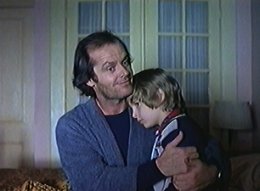
Jack: How's it goin' Doc?
Danny: OK.
Jack: Havin' a good time?
Danny: Yes Dad.
Jack: Good. I wantcha to have a good time.
Danny: I am, Dad. Dad?
Jack: Yes?
Danny: Do you feel bad?
Jack: No. Seem a bit tired.
Danny: Why don't you go to sleep?
Jack: I can't. I have too much to do.
Danny: Dad?
Jack: Yes.
Danny: Do you like this hotel?
Jack: Yes, I do. I love it. Don't you?
Danny: I guess so.
Jack: Yeah. I want you to like it here. I wish we could stay here forever, and ever, ever. [He echoes the words of the two ghost-girls from the previous scene.]
Danny: Dad?
Jack: What?
Danny: You would never hurt Mommie or me, would ya?
Jack: What do you mean? Did your mother ever say that to you? That I would hurt you?
Danny: No, Dad.
Jack: Are you sure?
Danny: Yes, Dad.
Jack: I love you, Danny. I love you more than anything else in the whole world. And I would never do anything to hurt ya, never. You know that, don't ya? Huh?
Danny: Yes, Dad.
Jack: Good.
Wednesday
From his play with his toy cars and trucks on the brightly-colored, patterned hallway carpeting, Danny is beckoned by a rolling yellow tennis ball that comes up to him. Uneasily, he calls out: "Mom, Mom, Mom, are you in there?" as he is lured into the enigmatic Room 237, which stands open. As Wendy checks out electrical and boiler gauge settings in the utilities room, she hears loud animalistic yelps and groans. Rushing upstairs to Jack, she finds him asleep and in agony - collapsed in front of his typewriter, visibly drooling and experiencing Grady-like, nightmarish visions of murderous atrocity. After awakening him, he falls to the floor, distraught by his dreams:
Jack: The most terrible nightmare I ever had. It's the most horrible dream I ever had.
Wendy: It's OK, it's OK now. Really.
Jack: I dreamed that I, that I killed you and Danny. But I didn't just kill ya. I cut you up in little pieces. Oh my God. I must be losing my mind.
Wendy: Everything's gonna be all right.

Wendy: You did this to him, didn't you? You son-of-a-bitch. You did this to him! Didn't you? (Jack shakes his head in denial) How could you? How could you?
Jack: (softly, after she has exited) No.
Wandering down the hotel's hallway as he gesticulates to himself in anger, Jack enters into the Gold Room, turns on the lights, crosses the room, and falls onto a stool at the 'dry' bar - empty of people and booze. Unwittingly, he has entered many decades earlier into the ancient past of the hotel and is being sucked deeper into demonic, past forces that affected it. With self-pity in his voice and suffering from a past weakness and dependence for alcohol, a sense of powerlessness, debilitating writer's cramp, and an inability to cope with the frustrations of his family and his dislocated, unhealthy marriage, he sighs and mutters to himself a corrupting bargain for his soul:
God, I'd give anything for a drink. I'd give my god-damned soul for just a glass of beer!
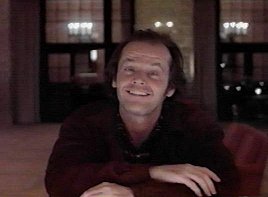
In a classic monologue-of-sorts, Jack speaks to the archetypal bartender and suddenly gains bar-talk "words of wisdom" in his speech:

Jack: Hi, Lloyd. A little slow tonight, isn't it? (Jack emanates a belly laugh)
Lloyd: Yes it is, Mr. Torrance. What'll it be?
Jack: I'm awfully glad you asked me that, Lloyd. Because I just happen to have two twenties and two tens right here in my wallet. I was afraid they were gonna be there until next April. So here's what. You slip me a bottle of bourbon, a little glass, and some ice. You can do that, can't you Lloyd? You're not too busy, are ya?
Lloyd: No sir, I'm not busy at all.
Jack: Good man. You set 'em up and I'll knock 'em back, Lloyd, one by one. White man's burden, Lloyd, white man's burden. (Jack opens his wallet and finds it empty) Say Lloyd, it seems I'm temporarily light. How's my credit in this joint, anyway?
Lloyd: Your credit's fine, Mr. Torrance.
Jack: That's swell. I like ya, Lloyd. I always liked ya. You were always the best of 'em. Best god-damn bartender from Timbuktu to Portland, Maine - or Portland, Oregon for that matter.
Lloyd: Thank you for saying so.
Jack: Here's to five miserable months on the wagon and all the irreparable harm that it's caused me.
Lloyd: How are things going, Mr. Torrance?
Jack: Things could be better, Lloyd. Things could be a whole lot better.
Lloyd: I hope it's nothing serious.
Jack: No. (He taps the bar for a second drink) Nothing serious. Just a little problem with the, uh, ol' sperm bank upstairs. Nothing I can't handle, though Lloyd, thanks.
Lloyd: Women. Can't live with 'em. Can't live without 'em.
Jack: Words of wisdom, Lloyd. Words of wisdom. I never laid a hand on him, god-damn it. I didn't. I wouldn't touch one hair on his god-damned little head. I love the little son-of-a-bitch. I'd do anything for him. Any f--kin' thing for him. That bitch! As long as I live, she'll never let me forget what happened. I did hurt him once, OK? But it was an accident, completely unintentional. Could have happened to anybody. And it was three god-damned years ago. The little f--ker had thrown all my papers all over the floor. All I tried to do was pull him up - a momentary loss of muscular coordination. A few extra foot-pounds of energy per second, per second.
Hysterical and frantic, Wendy runs into the bar carrying a baseball bat and retrieves Jack from his reverie. She screams that Danny was attacked and strangled by a crazy woman: "Jack, there's someone else in the hotel with us. There's a crazy woman in one of the rooms. She tried to strangle Danny." Lloyd - the fraternizing ghost and the well-stocked bar, and any other evidence of the supernatural immediately disappear, yet Jack still seems drunk. Jack turns to her, and responds to her gradual descent into craziness with a role reversal:
Jack: Are you out of your f--kin' mind?
Wendy: No, this is the truth, really! I swear it, Danny told me. He went up into one of the bedrooms. The door was open and he saw this crazy woman in the bathtub. She tried to strangle him.
Jack: Which room was it?
The next scene begins with a close-up of the start of the "Newswatch" program on TV, a show anchored by Glenn Rinker in the Miami, Florida area. As the camera slowly pulls back, an impassive, motionless Hallorann watches the Miami-based TV broadcast (a report on the blizzard in the Rockies that is affecting the Overlook Hotel) through his outstretched feet on the bed. It is the off-season home of Dick Hallorann. (His bedroom is adorned with large portraits of proud, busty, naked black women.) As a shrill squeak and a thunderous heartbeat rise in volume, his stony face changes - his eyes widen and lift up with an aghast look toward the ceiling. His mouth opens and his face trembles. He registers horror to a "shining" vision - danger and an SOS call for help possibly communicated by Danny's psychic telepathy:

- the open door of Room 237 from the hallway of the Overlook, with the red hotel key in the lock
- a close-up of Danny drooling and shivering in a trance
- a camera pan inside Room 237
[From this point until Chef Dick Hallorann finally arrives at the Overlook Hotel on a rescue mission, scenes are intercut showing him frantically calling the hotel - unsuccessfully; having the Fire Service attempt contact by radio - unsuccessfully; flying to Colorado by plane and then renting a car and driving to Boulder during a snow-storm traveler's advisory, and on the last leg of the trip, borrowing a Snow-Cat to get to the Overlook.]
Jack responds to Wendy's summons to go investigate Room 237 - the room which Hallorann warned Danny never to enter - the central heart and key to the deadly horror of the hotel. Following the camera pan inside the room, Jack's hand slowly pushes open the half-closed bathroom door of the mysterious, green and orange room. Behind the bathtub curtain, a hazy, nude figure is taking a bath. When the young, totally-nude female figure (Lia Beldam) draws back the sheer white shower curtain, rises, and steps from the tub, Jack lustfully leers back at her in anticipation of her slow-motion approach. The attractive, ghostly apparition sexually seduces him away from loyalty to his wife - he is already alienated from her anyway. The heart-beat, echoing loudly on the soundtrack, ties together Dick's apparition, Danny's SOS psychic transmission, and Jack's entry into the bathroom.
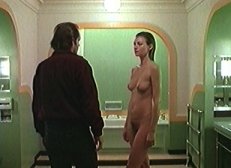
When she stops in the middle of the room, he starts
toward her - she seductively moves her hands up over his chest and
around his neck. Jack embraces and kisses the illusory, beautiful bather
- but when he looks over her shoulder at their embrace in the mirror
behind her, he sees that she is a demon, necrophiliac lover - a
pulsating, partially-decomposed corpse - a wrinkled, thick-skinned old
hag (Billie Gibson)! The hotel's forces mock his weakness - she cackles
at his tempted infidelity and attraction for the dead. The ruinous
disintegration of his life - his writing, his family ties, his marriage,
his self-worth - is almost complete.
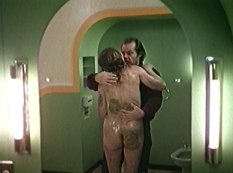
When Jack returns from his encounter, he denies that there was anything in Room 237, placating Wendy by assuring her that Danny will soon be "himself" again. Wendy, however, doesn't necessarily believe him, asking about his explanation for the bruises on Danny's neck. Jack answers that Danny could have injured himself - like he did in the episode he suffered before their move to the Overlook:
Wendy: Did you find anything?
Jack: No, nothing at all. I didn't see one god-damned thing.
Wendy: You went into the room Danny said - to 237?
Jack: Yes, I did.
Wendy: And you didn't see anything at all?
Jack: Absolutely nothin'. How is he?
Wendy: He's still asleep.
Jack: Good. I'm sure he'll be himself again in the morning.
Wendy: Well, are you sure it was the right room? I mean, maybe Danny made a mistake?
Jack: He must have gone in that room. The door was open, the lights were on.
Wendy: Oh, I just don't understand it. What about those bruises on his neck? Somebody did that to him.
Jack: I think he did it to himself.
Wendy: No, that's not possible.
Jack: Wendy, once you rule out his version of what happened, there is no other explanation, is there? It wouldn't be that different from the episode that he had before we came up here, would it?
In bed, Danny, with his extra-sensory ability, suffers from another trance. He overhears the conversation between his parents and reacts with his feverish imagination to all instances of his father's mistreatment of him. He sees the word: "REdrUM" scrawled in red across a door while reacting in horror to his father's deception. Jack self-defensively flares up with rage at Wendy for even suggesting that they give up their contractual arrangement with the macabre hotel and leave - in order to get Danny out of the hotel:
Wendy: Whatever the explanation is, I think we have to get Danny out of here.
Jack: Get him out of here?
Wendy: Yes.
Jack: You mean just leave the hotel?
Wendy: Yes. (Danny envisions the hotel elevator lobby again filling with torrents of blood splashing out of the elevator)
Jack: (exploding in rage) This is so f--king typical of you to create a problem like this when I finally have a chance to accomplish something - when I'm really into my work! I could really write my own ticket if I went back to Boulder now, couldn't I? Shoveling out driveways, work in a car wash. Doesn't that appeal to you?
Wendy: Jake.
Jack: Wendy, I have let you f--k up my life so far, but I am not gonna let you f--k this up!
Jack storms off out of the apartment and into the hotel's kitchen as Wendy breaks into tears on the bed. After taking out his rage in the kitchen, he finds the hotel corridor strewn with festive party decorations - colored balloons, streamers, and confetti. In the distance, he hears the sounds of a 1920s dance band and party revelers within the Gold Room, now transformed into a nightclub ballroom. Forgetting his anger for the moment, Jack strides through the entrance in his common, caretaker garb. He is greeted: "Good evening, Mr. Torrance." The spectral party-goers are grotesquely beautiful, resembling characters in The Great Gatsby with their period costumes. He proceeds to the bar, where Lloyd is still the faithful bartender, satanically dressed with red, horn-shaped lapels on his jacket. Jack, who feels right at home with his "ancestors," invites himself to partake with a drink of the "hair of the dog that bit me." He is surprised that the bourbon is free of charge:
Jack: Hi, Lloyd. Been away, but now I'm back.
Lloyd: Good evening, Mr. Torrance. It's good to see you.
Jack: It's good to be back, Lloyd.
Lloyd: What'll it be, sir?
Jack: Hair of the dog that bit me.
Lloyd: Bourbon on the rocks.
Jack: That'll do her.
Lloyd: No charge to you, Mr. Torrance.
Jack: No charge?
Lloyd: Your money is no good here. Orders from the house.
Jack: 'Orders from the house?'
Lloyd: Drink up, Mr. Torrance.
Jack: I'm the kind of man who likes to know who's buyin' their drinks, Lloyd.
Lloyd: It's not a matter that concerns you, Mr. Torrance. At least not at this point.
Jack: Anything you say, Lloyd. Anything you say.
As he strolls among the guests, the demented Jack collides with a waiter and "advocaat" is spilled down his jacket front. They are sidetracked to the stunningly-red interior of the gentlemen's room where the waiter dutifully cleans Jack's coat. The ghostly waiter's name is Delbert Grady (Philip Stone), whose name is the same as Jack's murderous predecessor/caretaker. Jack asks a few nervous, accusatory questions, but Grady graciously denies ever having been the caretaker of the Overlook and has no memory of it, although he matches the description and has "a wife and two daughters." Grady asserts that Jack, an ex-school teacher, has always been present in the hotel as its caretaker, presumably in a past life, in a different time period, or in a previous reincarnation. [Grady should know - he has also "always been" at the hotel, both in the 1920s, and in 1970 (fifty years later) when he murdered his family]:

Jack: Mr. Grady. You were the caretaker here. I recognize ya. I saw your picture in the newspapers. You, uh, chopped your wife and daughters up into little bits. And then you blew your brains out.
Grady: That's strange, sir. I don't have any recollection of that at all.
Jack: Mr. Grady. You were the caretaker here.
Grady: I'm sorry to defer with you, sir. But you are the caretaker. You've always been the caretaker. I should know, sir. I've always been here.
The steely-eyed, unctuous, British-accented, quasi-cultured (and racist) servant warns Jack about his son's attempt to bring an outsider into the Overlook. With a combination of deference and mastery in the scene, Grady suggests that his "duty" is to protect (care-take) the well-being of the hotel. And sometimes, he advises, a family needs to be "corrected" when it is offensive. The loathsome English waiter, a personification of Jack's inner demons, goads Jack into maintaining control (and ensuring the predominance of evil in the hotel) over his family with brutal, murderous force by correcting his boy's willfulness:
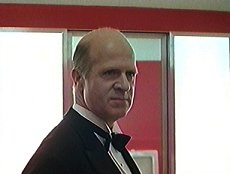
Grady: Did you know, Mr. Torrance, that your son is attempting to bring an outside party into this situation? Did you know that?
Jack: No.
Grady: He is, Mr. Torrance.
Jack: Who?
Grady: A nigger.
Jack: A nigger?
Grady: A nigger cook.
Jack: How?
Grady: Your son has a very great talent. I don't think you are aware how great it is. That he is attempting to use that very talent against your will.
Jack: He is a very willful boy.
Grady: Indeed he is, Mr. Torrance. A very willful boy. A rather naughty boy, if I may be so bold, sir.
Jack: It's his mother. She, uh, interferes.
Grady: Perhaps they need a good talking to, if you don't mind my saying so. Perhaps a bit more. My girls, sir, they didn't care for the Overlook at first. One of them actually stole a pack of matches, and tried to burn it down. But I corrected them sir. And when my wife tried to prevent me from doing my duty, I corrected her.
Pacing back and forth in their apartment, Wendy considers taking the Snow-cat to notify the Fire Service rangers that they are evacuating the premises: "If Jack won't come with us, I'll just have to tell them that we're goin' by ourselves." Wendy finds Danny in his bedroom where he incants the mantra "Redrum," and trance-like speaks in the low, gutteral, growling voice of Tony, telling her that Danny's personality has been taken over by Tony, his alter ego: "Danny's not here, Mrs. Torrance...Danny can't wake up, Mrs. Torrance...Danny's gone away, Mrs. Torrance." To cut the hotel off from the outside world, Jack disconnects important components from the inside of the CB radio.
8 am
After learning that the Forest Service has been unable to reach the Torrances, Dick Hallorann is on a plane to Stapleton Airport in Denver. He phones Larry at Durkin's Auto Supply, a friend at the Snow-Cat rental facility in Boulder. He tells him that he will drive a rental car to Boulder and then rent a Sno-Cat which he can take to the Overlook in the snowstorm: "We got a very serious problem with the people who are taking care of the place. They turned out to be completely unreliable ass-holes. Ullman phoned me last night and I'm supposed to go up there and find out if they have to be replaced."
Wendy and Danny sit and stare in front of a TV playing a Roadrunner cartoon [thematically similar in theme to the film's life and death chases]. She tells Danny that she will leave him for a few minutes to go talk to Jack. Armed with a baseball bat, she approaches toward Jack's work den in the Colorado Lounge. In the film's most frightening moment, a moment of pure terror and also a brilliant moment in cinema, Wendy, who has been forbidden to look at Jack's manuscript, looks down from above Jack's typewriter - she sights down on a single sentence repeated many times on the piece of paper:
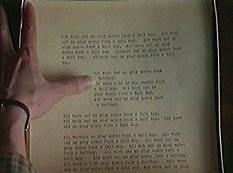
All work and no play makes Jack a dull boy.
Then to her horror as she realizes her husband is truly insane, his endlessly-repeating typographical configurations, all permutations and variations of the same sentence, are found on reams and reams of paper, revealing the self-deception of Jack's bankrupt mind and spirit in his insipid script. From behind, Jack emerges, startles her and asks: "How do you like it?" Dread-filled, she jumps from fright, turning to see Jack's smiling, demonically insane, shining face. Jack's mental vulnerabilities and failings have been uncovered by his nagging wife, and he reacts with a mixture of embarrassment, possession, and projected rage.
With his clairvoyant eyes and senses, Danny "shines" on Jack's perverse terrorization of Wendy. His deranged father poses sneering, sarcastic questions about their maladjusted family and "what should be done" about their son. Wendy admits that there may be a problem, and Danny should be taken to a doctor. Jack accuses her of being self-centered and blind to his own responsibilities and commitments at the Overlook:
Jack: ...I think you have some very definite ideas about what should be done with Danny. And I'd like to know what they are.
Wendy: (sputtering with fear) I think maybe he should be taken to a doctor.
Jack: You think maybe he should be taken to a doctor.
Wendy: Yes.
Jack: When do you think maybe he should be taken to a doctor?
Wendy: As soon as possible.
Jack (imitating cruelly): As soon as possible.
Wendy: Yes. Please.
Jack: You believe his health might be at stake.
Wendy: Yes.
Jack: You are concerned about him.
Wendy: Yes.
Jack: And are ya concerned about me?
Wendy: Of course I am.
Jack: Of course you are. Have you ever thought about my responsibilities?
Wendy: Oh Jack. What are you talking about?
Jack: (worked up) Have you ever had a single moment's thought about my responsibilities? Have you ever thought for a single solitary moment about my responsibilities to my employers? Has it ever occurred to you that I have agreed to look after the Overlook Hotel until May the first? Does it matter to you at all that the owners have placed their complete confidence and trust in me, and that I have signed a letter of agreement, a contract, in which I have accepted that responsibility? Do you have the slightest idea what a moral and ethical principle is, do you? Has it ever occurred to you what would happen to my future if I were to fail to live up to my responsibilities? Has it ever occurred to you? Has it?!
As he backs her up the stairs at the beginning of a prolonged stalking, she defensively swings the bat at him, wondering how to escape his homicidal, ferocious temper:

Wendy: (swinging the bat at him with short, chopping strokes) Stay away from me! I just want to go back to my room.
Jack: Why?
Wendy: Well, I'm very confused. I just need a chance to think things over.
Jack: You've had your whole f--king life to think things over. What good's a few minutes more gonna do you now?
Wendy: Stay away from me! Please! Don't hurt me!
Jack: I'm not gonna hurt ya. Wendy, darling. Light of my life. I'm not gonna hurt ya. You didn't let me finish my sentence. I said, I'm not gonna hurt ya. I'm just gonna bash your brains in. I'm gonna bash 'em right the f--k in.
Wendy: Stay away from me! Don't hurt me!
Jack: I'm not gonna hurt you.
Wendy: Stay away from me! Please!
Jack: Stop swinging the bat.
Wendy: Stay away from me!
Jack: Put the bat down, Wendy.
At the top of the stairs, Wendy escalates the disintegration of their hate-filled family and their immediate conflict by swinging and connecting. [The first actual blows that strike a spouse are hers!] The bat hits him on the hand and then on the head, sending Jack tumbling down the steep flight of stairs. She drags his unconscious body by the feet to the food storage locker and encloses him inside. The bash on the head has drawn blood, contributing to disturbed Jack's declining powers of sanity. Behind the storeroom door, he tries various approaches and tactics to get her to open the door. First, he viciously commands her to open the door immediately. A second strategy is to reason with her: "Lemme outta here and I'll forget the whole god-damned thing. It'll be just like nothin' ever happened." And thirdly, he appeals to her emotions and her pity: "Wendy, baby, I think you hurt my head real bad. I'm dizzy. I need a doctor. Honey, don't leave me in here." None of his approaches are effective.
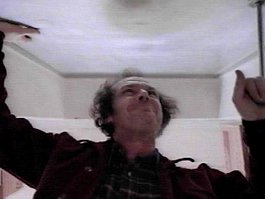
4 pm
From outside the locker, a sleeping Jack is summoned by a knock on the door and Grady's echoing voice. The stern waiter reprimands him for ignoring his advice, and then continues to prod and incite marital violence. Grady, Jack's predecessor caretaker and the voice of the hotel, doubts that Jack can effectively discipline his family in the Overlook. Jack, the eternal caretaker, who is destined to murder his children (the next generation) over and over again, is ridiculed for not having "the belly" to commit more murders. Jack begs - and gives his word - to be given one more chance:
Grady: I see you can hardly have taken care of the business we discussed.
Jack: No need to rub it in, Mr. Grady. I'll deal with that situation as soon as I get out of here.
Grady: Will you indeed, Mr. Torrance? I wonder. I have my doubts. I and others have come to believe that your heart is not in this, that you haven't the belly for it.
Jack: Just give me one more chance to prove it, Mr. Grady. It's all I ask.
Grady: Your wife appears to be stronger than we imagined, Mr. Torrance, somewhat more resourceful. She seems to have got the better of you.
Jack: For the moment, Mr. Grady, only for the moment.
Grady: I fear you will have to deal with this matter in the harshest possible way, Mr. Torrance. I fear that is the only thing to do.
Jack: There's nothing I look forward to with greater pleasure, Mr. Grady.
Grady: You give your word on that view, Mr. Torrance?
Jack: I give you my word.
The supernatural spirit releases and unlocks the pantry door for Jack, substantiating the idea that more than spectral ghosts are at work in the hotel.
In the Torrance's apartment, Wendy sleeps in bed. Danny methodically repeats "Redrum" in Tony's voice as he picks up a sharp butcher knife on the nightstand next to his sleeping mother. He brandishes the knife over her and slides his finger down the sharp edge of the blade. Danny takes a tube of red lipstick from the dresser and writes "Redrum" on their bathroom door while bleating out the word - this fulfills his previous telepathic vision. His writing spells "Murder" in the dresser mirror's reflection. Wendy understands the revelation in the mirror - Jack wants to murder her.
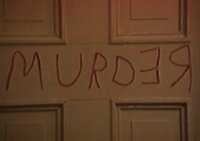
Wendy, I'm home.
Both Danny and Wendy retreat to the bathroom. Danny escapes and slides down a giant drift of snow resting next to their bathroom window, but Wendy is unable to fit through the ice-jammed window's narrow passageway. As Jack stalks her into the bathroom, he lurches after her with a loathsome, macabre sense of humor, envisioning them in a bizarre, tragic-comic fairytale in which he is the 'big bad wolf':
Little pigs, little pigs, let me come in...Not by the hair on your chinny, chin - chin...Then I'll huff, and I'll puff, and I'll blow your house in!
He smashes his way into the bathroom door, with each stroke of the blade jutting through the wood, as his screaming wife watches his progress with her butcher knife poised to strike. He peers through with an evil grin:

Heeeeeere's Johnny!
Again, Wendy strikes the first blow, whacking his hand with her sharp blade when he tries to open the door handle. The grinding sound of Hallorann's approaching Snow-Cat perks up all their ears. Danny runs back inside and hides inside a metallic storage cabinet. Bent on destruction, Jack departs from his attack on Wendy, hunches himself over, and limps through the kitchen and lobby to find "the outside party" that Grady had warned about. As Hallorann calls out: "Anybody here?" Jack jumps out from behind a pillar, swings the axe at him, and puts it through his chest, leaving the sacrificed, murdered man lying across a large Indian design on the floor of the lobby. [The placement of the bloodied black man on an Indian design brings up multiple images of violence and hostility in American history. If Hallorann had the gift of telepathy and clairvoyance, wouldn't he have known of the ambush?] Danny screams in terror. Now obscenely evil, Jack hears Danny and knows his hiding place, causing the boy to run from the kitchen cabinet with his father carrying a blood-stained axe in pursuit.
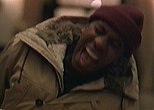
In the climactic conclusion, Jack hobbles and staggers after his son through the blizzard into the outdoor garden's icy maze. In marvelous, Steadi-cam tracking shots, the chase is captured through the winding, frozen tunnels and corridors. Pursuing his son with murderous intent and the threat of annihilation, Jack follows and chases after his son's footprints in the frosted snow, in a symbolic attempt to visit "the sins of the father" upon his own flesh and blood. He cries out with wild and inarticulate grunts:
Danny! I'm coming! You can't get away! I'm right behind ya.
In the hotel, Wendy, who is now insanely possessed with fear, witnesses enigmatic, troubling sights: Hallorann lying bloodied in the lobby; a tuxedoed, bloody-faced Grady toasting her with a glass and a smile: "Great party, isn't it?"; cob-webbed skeletons of past hotel guests seated in familiar positions; and the vision (familiar to Danny) of the elevator doors releasing torrents of blood.

Using an old Indian trick in an age-old game, Danny
retraces his steps by backing up in his own footsteps in the snow and
then hiding off to the side in some hedges. After Danny manages to
escape the maze and leaps into his mother's arms, crying in relief
"Mommy! Mommy!" [rather than Tony's greeting of "Mrs. Torrance"].
Presumably recovered, he and Wendy manage to escape in Hallorann's
Snow-cat, leaving Jack in the convoluted maze - where he freezes and
dies from the cold in his tracks. The next day, a gruesome shot shows
Jack's frozen face and body covered with ice and snow.

The closing shot is an extremely long tracking shot into a hallway outside the Gold Room toward one framed photograph - it is in a rectangular grouping of twenty-one black and white framed pictures which freeze moments of time on the wall. 1920s, Fitzgeraldian period music from a dance band plays in the background. The black-and-white image of the picture is from the Overlook's evil time-zone, taken during the hotel's hey-day (1921) at the July 4th Ball. Broadly grinning and waving, a younger-looking Jack is forefront in the picture, safely absorbed into the scene. Behind him are ghostly revelers all dressed in smart, 1920s garb. The inscription: "Overlook Hotel / July 4th Ball / 1921."
